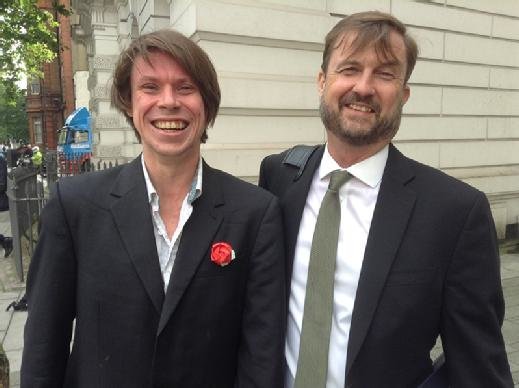
Alleged hacker Lauri Love’s ‘life will be destroyed’ under Trump regime
Supporters fear for activist Lauri Love if his extradition to face hacking charges to the US goes ahead
Alleged computer hacker Lauri Love’s “life will be destroyed” if he is extradited to the US under Donald Trump’s presidency, his lawyers said today.
Love’s New York-based attorney, Tor Ekeland, said the presidential election result was likely to impact badly on Love.
His comments came as Trump appointed well-known “hardliners” to head the CIA and the US Department of Justice.
“I think you are going to potentially be able to see a very vindictive Department of Justice, one that is perhaps less interested in cutting plea deals,” said Ekeland.
Love faces charges of hacking into US institutions, including Nasa, an FBI computer forensics laboratory and the Federal Reserve Bank, in a string of security attacks between 2012 and 2013. His conviction could attract a prison sentence of 99 years.
Love’s extradition was approved by UK Home Secretary Amber Rudd on 14 November, despite the court’s acknowledgement that Love was at high risk of suicide.
Some 114 MPs from all political parties have written to outgoing US president Barack Obama asking him to drop the extradition request against Love, who has been diagnosed with Asperger’s syndrome and depression, on humanitarian grounds before Obama leaves office in January 2017.
It emerged in court documents presented in the case that nearly 30 people who had been accused of hacking into US computer systems had been successfully tried in the UK.

Ekeland (pictured above with Love) described Trump as someone who “seems to be a very vindictive individual who lacks empathy and compassion”.
Love would face disproportionate punishment in US courts under a Trump presidency, he said.
“I have first-hand experience of these kinds of case in the US and I think the punishments that are meted out and the conditions that are meted out are very harsh and grossly disproportionate to the alleged crime,” he told Computer Weekly.
Trump has appointed ‘hardliners'
Trump has surrounded himself with “right-wing hardliners”, including outspoken critics of human rights, in his first few days as president-elect.
They include Jeff Sessions, the right-wing senator from Alabama who has clashed with the American Civil Liberties Union on human rights issues, who will take over as Attorney General.
And Congressman Mike Pompeo, who has spoken in favour of the harsh treatment of prisoners at Guantanamo Bay and has supported the extension of bulk surveillance by the US following the Snowden revelations, as the new head of the CIA.
Trump has also had talks with former New York City Mayor Rudy Giuliani – “a very strict law and order man”, said Eckland – as a potential Secretary of State.
“I think you’re going to see prosecutions and I think you’re going to see them seek the maximum penalties they can get and, in a case like Lauri’s, that is fairly significant,” he said. “That can mean he spends the rest of his life in jail.”
Hopes rest with the appeal court
David Burrowes, MP for Enfield Southgate, who led the parliamentary campaign, said Love’s best hope was now the Court of Appeal.
“Lauri Love’s life now rests with the High Court, which we hope will do what Theresa May did for Gary McKinnon and what Parliament has since intended, which is recognise it is not right to extradite him,” said Burrowes. “Failing that, we will have to ask Donald Trump to step in.”
Cheryl Gillan, MP for Chesham and Amersham and chair of the Autism All Party Parliamentary Group, told Computer Weekly that extradition was unsuitable for people with Asperger’s syndrome.
“I have written to the Home Secretary to ask her to look at making changes to our laws on extradition and offences to take into account people with a diagnosis of autism and to express my concern about the welfare of Mr Love,” she said.
“I would prefer court hearings to be held in this country in cases such as this.”
Rudd had little room to manoeuvre
Home Secretary Rudd’s decision to proceed with the extradition disappointed Love’s supporters, but in practice she had little room for manoeuvre.
In 2012, the then Home Secretary Theresa May dropped extradition proceedings against former hacker Gary McKinnon on humanitarian grounds, following a 10-year legal battle.
At the same time, May introduced a legal rule, known as the “forum bar”, which it was claimed would make it easier for vulnerable extradition subjects to be tried in Britain.
The move effectively handed responsibility for extradition to the courts, giving future Home Secretaries less room to intervene.
Ekeland said that nevertheless, Rudd should have listened to the 114 MPs who raised humanitarian concerns about Love’s extradition with Obama.
“You have got a grossly distorted extradition relationship between the US and the UK, where basically the US dominates the relationship,” he said. “If I was a UK citizen, I don’t know if I would be able to tolerate that.”
Extradition treaty ‘one-sided’
Former hacker Gary McKinnon, who has also been diagnosed with Asperger’s syndrome, said that although the forum bar is good in principle, it does not always work.
“The UK is one of a very small number of countries that have extradition treaties with the US that allow one of their own to be taken with no evidence,” he said.
Now an internet consultant, McKinnon said the Home Secretary’s decision was “unfair”, and did not take into account all the criticisms of the UK-US extradition treaty over the years.
“Taking someone from their country of birth and residence is no small matter, especially when it can be done with a simple charge sheet and little or no supporting evidence,” he said.
Bethany Horne, an activist and writer who has been campaigning for Love, said Rudd’s decision to allow the extradition was disappointing.
“It could have been a point where she could have shown some leadership and that did not happen,” she said.
Patrick McElligott, another supporter, said Rudd had effectively signed Love’s death warrant.
Read more about Lauri Love
- Home Secretary Amber Rudd has signed off on a US extradition request made against the alleged computer hacker Lauri Love.
- Video Doc : Lauri Love – my battle with extradition.
- How did a brilliant but fragile student from a rural English town end up facing life imprisonment in the US? Computer Weekly speaks to Lauri Love.
- Computer activist Lauri Love should be spared a life sentence in US jail, says former hacker Gary McKinnon.
- More than 100 UK MPs have signed a letter to US president Barack Obama urging him to drop an extradition request against Lauri Love.
“It not only comes as a shocking indictment into how human rights and justice are viewed in this country, but also how the continuing relationship between the US and UK remain paramount despite previous evidence into human rights abuses and unfair treatment, especially of hackers and whistleblowers, in the US,” he said.
But Mustafa Al-Bassam, a former member of the LulzSec group who was prosecuted in the UK in 2011 for his part in hacking US federal institutions including the CIA, said the Home Secretary no longer had powers of discretion.
“The forum bar removed her power to block extraditions on a human rights basis – it’s a rubber-stamping exercise,” he said.
Love has not admitted any offences
Speaking from Ipswich on the BBC’s Today programme on the morning after Rudd’s ruling, Love made it clear he did not admit the charges filed against him.
“I am waiting to be accused in the UK,” he said. “When I am charged in the UK, then I can see the evidence and then I can form a defence with my legal team. That is what is done in every other criminal prosecution.”
To date, Love has not been shown any of the evidence on which the US government has based its indictments. He told the BBC this was something that should concern people from a constitutional point of view.
“If no evidence has to be shown and somebody can be taken away from their country to a country where they have never lived and potentially face 99 years – or the rest of their life – in prison, that is something that should trouble us and the government, and the court should try to prevent this situation,” he said.
Following the Today programme, listeners responded angrily on social media to what was seen as a heavy-handed attempt by the interviewer to put Love under pressure to admit wrongdoing.
US law enforcement officials have told Computer Weekly that Love’s case is regarded as serious because his alleged targets included the FBI’s regional computer forensics laboratory, which holds sensitive FBI casework.
Read more on Hackers and cybercrime prevention
-
![]()
Activist Lauri Love’s computer ‘contained hacked data’, says judge
-
![]()
Lauri Love takes legal action against NCA for return of seized computers
-
![]()
Lauri Love battles police for return of computers as NCA confirms live investigation
-
![]()
Lauri Love escaped extradition to the US - what does that mean for future cases?







